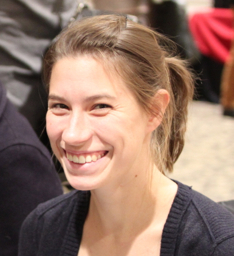Kasia Hitczenko
About

I'm an assistant professor in the Department of Linguistics and Cognitive Science at the University of Delaware. My research uses computational models and corpus analyses to study how children around the world learn language from highly variable input.
Prior to joining the University of Delaware, I was an assistant professor of practice in the Department of Computer Science at George Washington University. I got my Ph.D. in Linguistics from the University of Maryland in 2019, working with Naomi Feldman on computational models of speech perception and phonetic learning. From 2019-2021, I worked as a postdoc at Northwestern University, where I studied speech and language in individuals at high-risk for developing a psychotic disorder like schizophrenia. From 2022-2023, I was a postdoc at the Laboratoire de Sciences Cognitives et Psycholinguistique at the Ecole Normale Supérieure, where I worked with Alex Cristia as part of the Language Acquisition Across Cultures team.
Research
Hitczenko, K., Bergelson, E., Casillas, M., Colleran, H., Cychosz, M., Grosjean, P., Hamrick, L. R., Kelleher, B. L., Scaff, C., Seidl, A., Walker, S., and Cristia, A. (Stage 1 Accepted Registered Report). A cross-linguistic study of the effect of early experience on vocal development Developmental Science.
Zhang, T., Suresh, M., Warlaumont, A. S., Hitczenko, K., Cristia, A., and Cychosz, M. (2025). Employing self-supervised learning models for cross-linguistic child speech maturity classification. INTERSPEECH 2025.
Segal-Feldman, Y., Hitczenko, K., Goldrick, M., Buchwald, A., Roberts, A., and Keshet, J. (2025). Enhancing analysis of diadochokinetic speech using deep neural networks. Computer Speech and Language.
Hitczenko, K., Segal. Y., Keshet, Y., Goldrick, M., and Mittal, V. A. (2023). Speech characteristics yield important clues about motor function: Speech variability in individuals at clinical high-risk for psychosis. Schizophrenia.
Hitczenko, K., Bergelson, E., Casillas, M., Colleran, H., Cychosz, M., Grosjean, P., Hamrick, L. R., Kelleher, B. L., Scaff, C., Seidl, A., Walker, S., and Cristia, A. (2023). The development of canonical proportion continues past toddlerhood. Proceedings of the 20th International Conference of Phonetic Sciences (ICPhS).
Hitczenko, K. and Feldman, N. H. (2022). Naturalistic speech supports distributional learning across contexts. Proceedings of the National Academy of Sciences.
Havron, N., Scaff, C., Hitczenko, K., and Cristia, A. (2022). Community-set goals are needed to increase diversity in language acquisition research: A commentary on Kidd and Garcia. First Language.
Segal, Y., Hitczenko, K., Goldrick, M., Buchwald, A., Roberts, A., and Keshet, J. (2022). DDKtor: Automatic diadochokinetic speech analysis. INTERSPEECH 2022.
Hitczenko, K., Cowan, H. R., Goldrick, M., and Mittal, V. A. (2022). Racial and ethnic biases in computational approaches to psychopathology. Schizophrenia Bulletin.
Hitczenko, K., Cowan, H. R., Mittal, V. A., and Goldrick, M. (2021). Automated coherence measures fail to index thought disorder in individuals at risk for psychosis. Workshop on Computational Linguistics and Clinical Psychology.
Hitczenko, K., Mittal, V. A., and Goldrick, M. (2021). Understanding language abnormalities and associated clinical markers: The promise of computational methods. Schizophrenia Bulletin.
Corcoran, C., Mittal, V. A., Bearden, C. E., Gur, R., Hitczenko, K., Bilgrami, Z., Savic, A., Cecchi, G. A., and Wolff, P. (2020). Language as a biomarker for psychosis: A natural language processing approach. Schizophrenia Research.
Hitczenko, K., Mazuka, R., Elsner, M., and Feldman, N. H. (2020). When context is and isn't helpful: A corpus study of naturalistic speech. Psychonomic Bulletin and Review.
Hitczenko, K., Mazuka, R., Elsner, M., and Feldman, N. H. (2018). How to use context to disambiguate overlapping categories: The test case of Japanese vowel length. Proceedings of the 40th Annual Conference of the Cognitive Science Society.
Antetomaso, S., Miyazawa, K., Feldman, N. H., Elsner, M., Hitczenko, K., and Mazuka, R. (2017). Modeling phonetic category learning from natural acoustic data. Proceedings of the 41st Boston University Conference on Language Development.
Hitczenko, K. and Feldman, N. H. (2016). Modeling adaptation to a novel accent. Proceedings of the 38th Annual Conference of the Cognitive Science Society.
Hitczenko, K. and Jarosz, G. (2014). Cognitive limitations impose advantageous constraints on word segmentation. Proceedings of the 39th Boston University Conference on Language Development.
Teaching
Instructor
- Introduction to Programming with Python (co-instructor; Spring 2025)
- Discrete Structures II (co-instructor; Fall 2024)
- Natural Language Understanding (Spring 2024, Fall 2024, Spring 2025)
- Bayesian Models of Language (Winter 2020)
- Seminar in Speech Perception and Language Acquisition (Fall 2018)
TA
- Phonology I (Fall 2016)
- Introduction to Linguistics (for non-majors) (Fall 2015)